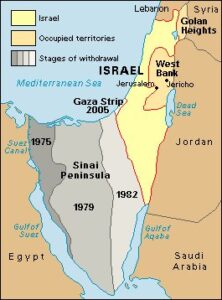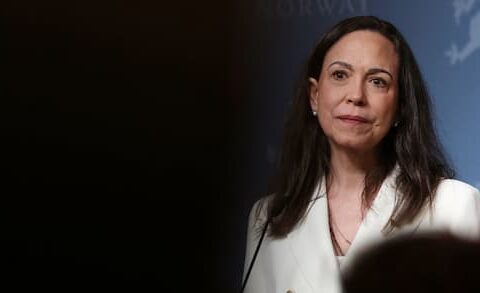Since the onset of the current Israel-Gaza crisis, a lot of discussion has gone on as to why Egypt had been refusing to open its border to Gazans, despite international pressure.
A lot was also made of the Jordanian King’s so-called snubbing of President Biden in the aftermath of the attack when a conference with Biden and Arab leaders was cancelled.
Let’s explore both these aspects of the situation: and, in particular, the important context that was being omitted from a lot of the major media coverage of these events, as well as how all of this might relate back to the long suspected ‘Greater Israel Plan’.
Let’s start with Egypt. The most common reason speculated on by observers for the hesitation to open the Rafah Crossing to Gazan Palestinians is that the Egyptians didn’t want Hamas fighters sneaking into Egypt among the civilians.
But there’s another factor in play here.
You might recall that one of the major ideas pushed by the Netanyahu government and Trump and Jared Kushner was to move Palestinians into Egypt’s Sinai and to have the Sinai form part of a prospective Palestinian state.
If you recall, the so-called Peace Plan or ‘Deal of the Century’ was unveiled by Donald Trump and Benjamin Netanyahu at the White House in January 2020: and, to be clear, there was no Palestinian representative present for the occasion or involved in the planning whatsoever.

In short, the Sinai part of the plan would have parts of Sinai annexed to part of Gaza to form the bulk of the Palestinian state. In some versions, a land bridge would link this up to part of the West Bank. But the implication was that Jerusalem, in all meaningful sense, would be ceded by the Palestinians.
Although the idea was reported to be supported by Saudi Arabia and the Gulf States, who were apparently willing to finance the projects (as well as economic initiatives relating to Palestinian movement into the Sinai), it has never been entirely clear just how much support the plan has in the Middle East.
This Sinai plan, as far as we know, isn’t something supported by the Egyptians, at least not publicly (though there have been numerous claims that the Sisi regime has been open to the idea behind closed doors). According to Reuters, as of October 18th, Egypt entirely claims to reject the displacement of Gazans into the Sinai.
Israel’s current assault in Gaza is seen by some as an attempt to depopulate Gaza by forcing the bulk of the population out. Most nearby states don’t want even more Palestinians displaced on a long-term basis.
It is, moreover, feasible that Egypt fears Israel is trying to push Palestinians into the Sinai and using this humanitarian crisis as a timely pretext. Which would be one reason they would refuse to open their border: the fear that, once in Egypt, the Palestinian refugees won’t be allowed back into Gaza by Israel, especially if this conflict goes on for a long time.
Many Arab states view any further displacement of Palestinians as simply a continuation of the ‘Nakba‘ (‘Catastrophe’), with expelled Palestinians having no right of return. Bear in mind just how many permanent Palestinian refugees are already in places like Jordan, Syria and Lebanon.
According to UNRWA statistics from 2015, there are over 2 million in Jordan, over half a million in Syria and just under half a million in Lebanon. And that’s not counting the number of displaced Palestinians in camps within the Palestinian territory.
And moreover, again, if there are a lot of Gazan refugees specifically in the Sinai for an extended period of time, Israel and its key allies might be emboldened to push for the pre-existing Sinai solution.
Let’s note that, in the wake of this current crisis post October 7th, Israeli officials were in fact specifically calling for Egypt to admit Palestinians into Sinai for safety: so it’s clear this is precisely what some Israeli policymakers have in mind. For example, the former Israeli Deputy Foreign Minister called, on October 15th, for Gazans to relocate to Egyptian Sinai in ‘tent cities’ to avoid the humanitarian crisis in Gaza.
So, essentially, the reticence in opening its border may be Egypt simply avoiding falling into a geopolitical trap. And not, as some commentators have made out, because Arabs don’t like Palestinians any more than Israel does.
In fact, the Sinai idea goes back a lot further than even the Trump/Netanyahu/Kushner plan.
As Johnathan Cook wrote in 2018: ‘It is important to understand that the Sinai plan is not simply evidence of wishful thinking by an inexperienced or deluded Trump administration. All the signs are that it has enjoyed vigorous support from the Washington policy establishment for more than a decade… In summer 2014, Israel’s media reported that, with Washington’s blessing, Israeli officials had been working on a plan dubbed “Greater Gaza” that would attach the enclave to a large slice of northern Sinai.’
‘The reports suggested that Israel had made headway with Cairo on the idea. Egyptian and Palestinians officials publicly responded to the leaks by denouncing the plan as “fabricated”. But, whether Cairo was privately receptive or not, it provided yet further confirmation of a decade-long Israeli strategy in Gaza…‘

It continued: ‘At around the same time, an Arab newspaper interviewed a former anonymous official close to Hosni Mubarak, the Egyptian president ousted in 2011. He said Egypt had come under concerted pressure from 2007 onwards to annex Gaza to northern Sinai, after Hamas took control of the enclave following Palestinian elections…’
And further: ‘Five years later, according to the same source, Mohamed Morsi, who led a short-lived Muslim Brotherhood government, sent a delegation to Washington where the Americans proposed that “Egypt cede a third of the Sinai to Gaza in a two-stage process spanning four to five years”…’
Security concerns might also be a factor. Hamas, after all, is derived from the Muslim Brotherhood, and the Sisi regime has been fighting the Muslim Brotherhood in Egypt ever since the fallout from the Arab Spring. Egypt has also had to fight the Islamic State group in the Sinai in recent years: so the idea of Hamas going into the Sinai might present a significant security threat to Egypt.
Let’s also remember, however, for all-important context, that Israel’s intelligence and military engineered Hamas’s rise to power in the first place. And that Netanyahu has been open about funding Hamas in order to keep the Palestinians divided.
I’m no fan of the Sisi regime in Egypt, but there’s also something perverse about some Israeli commentators blaming Egypt for the humanitarian crisis because of not opening its borders, when Egypt actually warned Netanyahu of the imminent Hamas attack ten days before it happened (see here): which, had the warning been acted on, most of this situation could’ve been avoided.
You also get perverse propaganda like Fox‘s Judge Jeanine Pirro’s rather insane and unhinged appearance on Piers Morgan’s show condemning the King of Jordan for not opening up Jordan’s border to fleeing Gazans, when Jordan already has over two million Palestinian refugees and when the Jordanian King has been frequently warning Israel to stop its provocations before things got out of hand.
As for King Abdullah of Jordan cancelling his planned hosting of President Biden and regional leaders, many had attributed this to the King taking note of Jordanian public outrage concerning the bombing of the Baptist hospital in Gaza.
Which is probably the case. However, let’s also remember that another of Kushner’s and Netanyahu’s grand ideas for the region was allegedly to have Saudi Arabia take over custodianship of the Holy Land, including crucially the Al-Aqsa/Temple-Mount, from the Jordanian royal family.

I covered this business here previously, along with what may well have been an Israeli-linked plot to overthrow the Jordanian King.
We don’t know what’s going on behind the scenes, even now. It was very out of character for King Abdullah, a steadfast US/Western ally, to clash with the United States or to snub the American President. His speech days ago at the Cairo summit showed his bitter opposition to Israel’s bombing of Gaza and his call for a return to the two-state solution.
Crucially – and this relates to the Egyptian equation highlighted above – he also staunchly opposed any displacement of Palestinians from Gaza, calling it a war crime.
However things evolve now geopolitically and diplomatically, let’s note that King Abdullah of Jordan is despised by Zionists in Israel, because of his custodianship of the Muslim and Christian holy sites in Jerusalem, which Israeli hardliners see as an intolerable obstacle to the plans for the Temple Mount in Jerusalem. Again, I covered this antagonistic relationship between Israel and the Jordanian King here.
In April this year, the Jordanian King in fact issued serious challenges to Israel’s escalations against Muslim and Christian holy sites, and even called on Muslims and Christians to be prepared to protect such sites.
Related to that, let’s also note that, since this latest bombing of Gaza in the wake of the October 7th terrorism, both a 7th century mosque and the third oldest church in the world were both bombed in Gaza’s Old City and these happened within hours of each other.
So there’s plenty of reason why the Jordanian King has been reacting the way he has to this latest escalation in the conflict. And his apparent snubbing of the US President may reflect his mounting frustration at America’s perceived greenlighting of Israel’s actions.
This has been even more in evidence in recent days with the Jordanian led UN Resolution calling for immediate ceasefire in Gaza: which was rejected by only 12 countries, led by the United States. Rather pathetically, as The Guardian exlained, ‘Six of the votes the US garnered were from Pacific islands: Fiji, Tonga, the Marshall Islands, Micronesia, Nauru and Papua New Guinea.‘
In general, it is obvious that some neighbouring states, especially those directly bordering Israel, are simply sick and tired of the situation in Israel/Palestine.
At any rate, when Netanyahu uses the horrible events of October 7th to proclaim that Israel’s response “will change the Middle East”, it’s hardly surprising that some neighbouring countries would feel very suspicious and that there is going to be significant geopolitical fallout.
In fact, Netanyahu was already proclaiming a ‘new Middle East’ to the UN General Assembly back in September – a few weeks before the events of October 7th.
Which naturally ignites suspicions about things like the Greater Israel plan and the Yinon Plan: both of which envision a radical reconfiguring of the Middle East’s maps and borders.
In fact, in March this year, the spectre of the Greater Israel conspiracy reared its head in a big way when ‘Israeli Finance Minister Bezalel Smotrich… gave a speech in Paris at a podium featuring a map that included Jordan and the occupied West Bank as part of Israel and said the Palestinian people were “an invention”…’
This implied of course a betrayal of Israel’s treaties and agreements with Jordan. The Israeli Foreign Ministry had to quickly issue a statement saying it was committed to all of its longstanding agreements with the Kingdom of Jordan.
But one doubts that the Jordanians were convinced. And it’s little wonder Jordan is watching Israel’s current actions and this Gaza crisis very closely.
Arguably then, the vision of Netanyahu and his hard-line Zionist allies has remained the same: October 7th only shifted the narrative and raised the stakes. For everyone in the region.
The Al-Aqsa/Jerusalem Flashpoint: And the Plot Against the King of Jordan…




